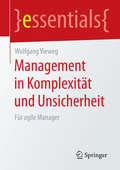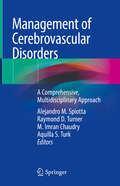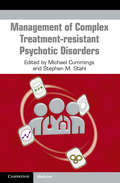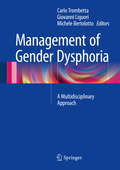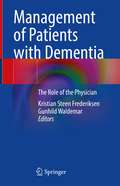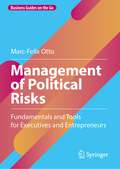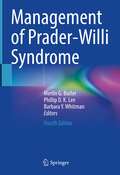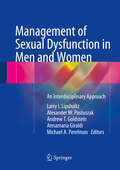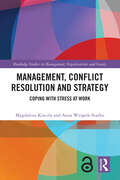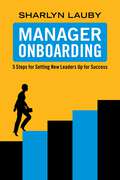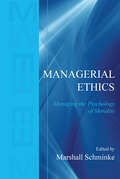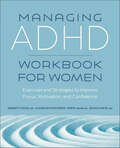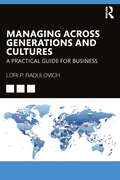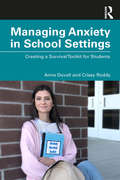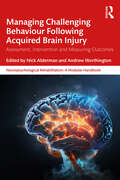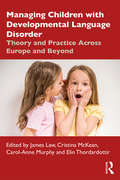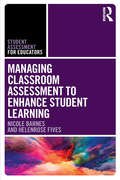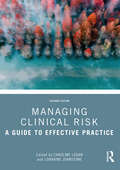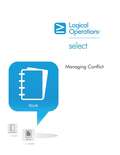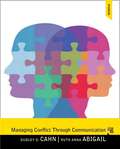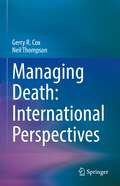- Table View
- List View
Management in Komplexität und Unsicherheit: Für agile Manager (essentials)
by Wolfgang ViewegWolfgang Vieweg behandelt die Frage, wie Management in komplexer, volatiler und unsicherer Umgebung nachhaltig erfolgreich sein kann. Warum versagen die herkömmlichen Ansätze? Und was konkret sichert zukünftigen Erfolg? Zwischen ,,kompliziert" und ,,komplex" liegen Welten: Heutiges Management, das dazu neigt, alles auszureizen, alles auf die Spitze zu treiben, steht vor einem fundamentalen Wandel. Erst eine neue Herangehensweise an die Welt, neue Konstrukte und neue agile Methoden gestatten es, mit Komplexität artgerecht und nutzbringend umzugehen.
Management of Cerebrovascular Disorders: A Comprehensive, Multidisciplinary Approach
by Alejandro M. Spiotta Raymond D. Turner M. Imran Chaudry Aquilla S. TurkThis important title brings together a distinguished panel of thought-leaders, known for their insights into the development and application of minimally-invasive surgical and endovascular techniques, to provide a comprehensive and discerning compendium of our most current knowledge and state-of-the-art procedures in the management of cerebral vascular diseases. Written in a style that is accessible to students and experienced practitioners alike, the book covers all the important recent advances that have reshaped the field in dramatic ways. Emphasizing how surgical and endovascular techniques are complementary, the volume includes illuminating chapters on the nexus of endovascular and conventional “open” cerebrovascular surgery, including patient assessment and practice in a hybrid operating environment, utilizing the best methods to achieve optimal outcomes. A major addition to the clinical literature, Management of Cerebrovascular Disorders: A Comprehensive, Multidisciplinary Approach will be of significant interest to neurosurgeons, neurologists, neuroradiologists, neurointensivists, students, residents, fellows, and specialized attending physicians.
Management of Complex Treatment-resistant Psychotic Disorders
by Cummings, Michael A. Dr. Stahl, Stephen M. Dr.This full-color, practical handbook provides a concise, evidence-based psychopharmacological approach to the management of complex treatment-resistant psychotic disorders. Part I focuses uniquely on topics and strategies relevant to treating this challenging patient population. These approaches go beyond standard guidelines while adhering to research and clinically derived data. Part II provides a concise array of information regarding those classes of medications most commonly used when treating complex treatment-resistant psychotic disorders. Each medication guide contains sections including mechanisms of action, typical treatment response, monitoring, dosing and kinetics, medications to avoid in combination/warnings, and take-home pearls. Part III offers tips in brief appendix chapters for managing common issues ranging from loading lithium and valproic acid to the treatment of acute psychomotor agitation. An essential resource for psychiatrists, forensic clinicians, psychiatric trainees, and all mental health professionals involved with, or interested in, the treatment of challenging psychotic disorders.
Management of Gender Dysphoria
by Carlo Trombetta Giovanni Liguori Michele BertolottoThis book is especially focused on the surgical aspect on Gender Dysphoria. Male to female surgery is widely discussed as well as the female to male conversion. Full information on hormone administration and surgical procedures are provided. Mental health issues are also described, as well as ethics, the law and psychosocial issues. The text is extensively referenced and includes numerous photos, tables and figures to clearly illustrate information. Based on collaboration between international experts in transgender health, this book is an essential guide for health care professionals, educators, students, patients and patients' families concerning the psychological, hormonal, surgical and social support of transgender individuals.
Management of Patients with Dementia: The Role of the Physician
by Gunhild Waldemar Kristian Steen FrederiksenThis book provides an overall introduction to the medical management of dementia with chapters dedicated to specific topics such as pain, epilepsy, vascular risk factors in dementia and review of medication, which are often not addressed in books on the subject, and thereby filling a gap in the field. Chapters are supplemented with cases to highlight key concepts and treatment approaches, and to provide the reader with the possibility to reflect on management options and the readers´ own current practice.This book is aimed at clinicians of different specialties (mainly neurology, psychiatry, geriatric medicine and general practice/family medicine) who manage patients with dementia on a regular basis, and thus provides useful guidance to be used in the clinic.
Management of Political Risks: Fundamentals and Tools for Executives and Entrepreneurs (Business Guides on the Go)
by Marc-Felix OttoPolitical risks are on the rise. The recent past has been characterized by a dominance of geopolitical risks, which have the potential to endanger companies, entire sectors, and even national economies. Furthermore, the expanding regulatory framework, growing national debt, and other factors contribute to the escalation of political risks. The book offers a comprehensive and proven approach to identify and manage such risks. In addition to avoiding and mitigating risks, there is an opportunity to cultivate competitive advantages in navigating these challenges. Throughout the book, three fictional companies—a chemical corporation, an electricity producer, and a commodity trader—accompany the reader and demonstrate how the provided tools can be applied in practical scenarios.
Management of Prader-Willi Syndrome
by Phillip D. K. Lee Barbara Y. Whitman Merlin G. ButlerNow in a fully revised and updated fourth edition, this book remains the most comprehensive resource on Prader-Willi syndrome (PWS) available on the market. There have been significant changes in the diagnosis, clinical care and treatment of PWS since the previous edition was published in 2006, and more thorough information on understanding the cause and diagnosis of the condition, along with clinical presentation and findings with natural history data now available. The book is divided into three thematic sections. Part One discusses the genetics, diagnosis, research and overview of PWS, including current laboratory testing. The medical physiology and treatment of PWS comprise Part Two, covering the GI system, obesity as well as the use of growth hormone. Part Three, the largest section, presents a wide-ranging, multidisciplinary management approach to PWS, attending to the many manifestations of the condition. Topics here include neurodevelopmental aspects, speech and language disorders, motor issues, psychological and behavioral management, educational and transitional considerations, vocational training and residential care, and advocacy for both school discipline and sexuality. Syndrome-specific growth charts, benefits eligibility information and additional resources are included in helpful appendices. Timely and well-crafted, this latest edition of Management of Prader-Willi Syndrome remains the gold standard for clinicians and health care providers working with patients diagnosed with this rare obesity-related genetic disorder.
Management of Sexual Dysfunction in Men and Women
by Larry I. Lipshultz Alexander W. Pastuszak Andrew T. Goldstein Annamaria Giraldi Michael A. PerelmanThis book provides a comprehensive, state-of-the art review of the intersection of male and female reproductive and sexual health. The text comprehensively discusses the evaluation and management of physical, genetic, and psychological causes of male and female sexual dysfunction. Discussion of treatment focuses on current medical and surgical psychosexual therapies in both the male and female. The book highlights erectile, ejaculatory, and orgasmic disorders in the ma≤ desire, arousal and orgasmic disorders in the fema≤ and an integrated approach to the couple. Lifestyle modifications through diet and exercise and optimization of anthropomorphic characteristics are also discussed, including a holistic approach to these disorders that goes beyond a focus on the genital system alone. Sexual Dysfunction in Men and Women: An Interdisciplinary Approach serves as a resource for physicians and researchers interested in sexual medicine seeking a comprehensive overview of the practice and novel research in the field.
Management, Conflict Resolution and Strategy: Coping with Stress at Work (Routledge Studies in Management, Organizations and Society)
by Anna Wziątek-Staśko Magdalena KraczlaManagers are key people in building the success of any organization. Business results depend on their efficiency in the implementation of the power entrusted to them. This efficiency, on the other hand, largely depends on psychosocial competences and personality predispositions. One of the main factors affecting destructively on managers is stress, destroying the level of their motivation to work, the level of commitment and ultimately resulting in premature professional burnout and a significant reduction in the level of efficiency. Ultimately, instead of efficient and motivated specialists, companies are struggling with employees suffering from depression. Exploration of the issue of identifying the sources of stress draws attention to conflict as one of the main research categories that are closely related to the category of stress. It is worth emphasizing that this relationship is two-way: conflict determines the level of stress, stress may determine the scale of conflict situations. This recommended monograph provides the latest knowledge on what contemporary managers use conflict resolution styles and what strategies they choose to deal with in stressful situations. A particular advantage of the study is the presentation of the links between both research categories, which are so paramount nowadays.
Managementberatung in Deutschland: Grundlagen, Trends, Prognosen (essentials)
by Thomas DeelmannThomas Deelmann analysiert Treiber und Trends derManagementberatung in Deutschland. Diese gilt seit Jahren als eine derschillerndsten und attraktivsten Branchen im Wirtschaftsleben und wird sehr ambivalent betrachtet: Sie ist ein attraktiver Arbeitgeber und von Kunden stark nachgefragt, gleichzeitig wird aber auch regelmäßig Kritik geäußert. Vor diesem Hintergrund stellt der Autor elf Thesen zur Managementberatung in Deutschland vor. 14 Experten aus Beratungs- und Kundenunternehmen sowie Marktbeobachter beziehenim Rahmen einer zweistufigen Delphi-Studie hierzu Stellung. Ihre Einschätzungen bieten einen exzellenten Einblick in die Branche und deren voraussichtliche Entwicklung.
Managementfehler und Managerscheitern
by Uwe Peter KanningDieselskandal, Bankenkrise, Flughafenbau – Managementfehler haben weitreichende Konsequenzen für die Gesellschaft. Sie ließen sich eindämmen durch professionelle Personalarbeit. Erstmals werden in diesem Fachbuch umfassend die Ursachen für das Entstehen von Managementfehlern vor dem Hintergrund wissenschaftlicher Erkenntnisse aus der Wirtschaftspsychologie dargestellt. Die Ursachen liegen sowohl in der Persönlichkeit der verantwortlichen Manager, als auch in ihren Arbeitsbedingungen sowie dem Verhalten von Vorgesetzen, Kollegen und Mitarbeitern. Das Buch liefert Checklisten zur Identifizierung von Risikofaktoren im Unternehmen und gibt Anregungen zur Intervention. Zielgruppen: Alle, die sich in Studium und Beruf mit Führung und Management beschäftigen, von Managementfehlern betroffen sind oder ihnen vorbeugen möchten: Personalexperten, Studierende und Dozenten der Psychologie, der Wirtschaftswissenschaften sowie verwandter Fächerund – nicht zuletzt – Manager selbst. Zum Autor: Prof. Dr. Uwe Peter Kanning ist Professor für Wirtschaftspsychologie an der Hochschule Osnabrück mit den Arbeitsschwerpunkten Personaldiagnostik, soziale Kompetenzen, fragwürdige Methoden der Personalarbeit. Er ist Träger zahlreicher Preise und Auszeichnungen, u.a. 2016 „Professor des Jahres“ (UnicumBeruf) oder 2017 Wahl unter die „40 führenden Köpfe des Personalwesens“ (Personalmagazin). Seit 1997 berät er Unternehmen und Behörden bei wirtschaftspsychologischen Fragestellungen.
Manager Onboarding: 5 Steps for Setting New Leaders Up for Success
by Sharlyn LaubyManagers play a vital role in onboarding but rarely receive onboarding themselves. Manager Onboarding offers HR and business leaders a practical roadmap for creating structured onboarding programs specifically for managers, whether newly hired or recently promoted.While onboarding touches nearly every part of the employee lifecycle, this book zeroes in on the early-stage support managers need to succeed. From recruiting and training to coaching and performance management, managers must lead confidently and yet often lack the same foundation we give new hires. Filled with real-world examples, stories and actionable advice, this book blends just enough theory with proven practices to help organizations build programs that elevate leadership from day one.
Managerial Ethics: Managing the Psychology of Morality
by Marshall SchminkeThis book combines management theory with ethical theory on a chapter by chapter, topic by topic basis. The volume bridges the theoretical, empirical and practical gap between management and ethics. It will be of interest to a cross disciplinary group of students, researchers and managers in business, management, organizational behavior, IO psychology and business ethics.
Managing ADHD Workbook for Women: Exercises and Strategies to Improve Focus, Motivation, and Confidence
by Beata Lewis Christy Duan Kathleen Fentress TrippFind focus and feel more in control with this ADHD guide for womenWomen with ADHD face unique challenges, but there are proven ways to understand and manage ADHD in your daily life. This ADHD workbook for adults breaks down the symptoms of ADHD, with strategies for navigating the ones that might be holding you back and emphasizing what makes you feel confident and capable.Skill-building exercises—Learn simple ways to improve practical skills like time management and organization, as well as emotional skills like acceptance and self-esteem.Relatable stories—Find inspiration in stories from other women with ADHD and how they've used these tips to succeed personally and professionally.Support for all women—This advice is designed to be useful no matter your age, your lifestyle, or what age you were diagnosed.Learn how to embrace adult ADHD with evidence-backed tips and activities that can help you achieve your goals.
Managing Across Generations and Cultures: A Practical Guide for Business
by Lori RadulovichDevelop powerful leadership skills with this concise guide to managing multigenerational and culturally diverse teams. Assess your leadership competencies using eight proven questionnaires that target critical areas for improvement. Build leadership credibility, communicate persuasively, and foster collaboration to drive higher team performance using the practical recommendations provided for each leadership trait.Today, managers face the daunting challenge of leading multigenerational teams from globally diverse cultures. This handbook provides specific steps to develop leadership competencies that create self-driven, high-performing teams by breaking down generational and cultural barriers. Measure your leadership competence with eight self-assessments and learn to: Build Leadership Credibility: Discover your leadership style and the key qualities of great leaders. Learn how to make better decisions, improve outcomes, and navigate conflict when facing adversity Communicate Persuasively and Impactfully: Identify your communication style and the message you reveal through words and body language. Learn to communicate clearly in complex cultural contexts and influence outcomes with data visualization and persuasion techniques Create High-Performing Teams: Bridge generational and cultural differences by sharing knowledge and skills to reverse biases, build trust, increase cultural sensitivity, and learn about global markets Lead Global Teams: Discover how managers leverage resources and nurture innovation for global expansion. Learn which industries exhibit accelerated internationalization and why After completing the self-assessments, you’ll create an Individual Development Plan by selecting specific recommendations to shore up skills and track your progress using the included Leadership Guiding Values Scorecard. Leaders and managers at all levels of seniority and across industries, as well as MBA students, will be inspired to build their leadership career path with insight and confidence using the concise review of global leadership topics and thoughtful recommendations presented in this handbook.
Managing Anxiety in School Settings: Creating a Survival Toolkit for Students
by Anna Duvall Crissy RoddyManaging Anxiety in School Settings dives into the growing topic of anxiety and its implications on students’ emotional and academic wellbeing, providing key insights into how to enable students to be successful inside and outside of the classroom. This book provides the reader with a tangible set of strategies for all grade levels that can be built into individualized anxiety survival toolkits for students to deploy discreetly and effectively both in the classroom and in their daily lives. With real-life examples from Anxious Annie in each chapter, readers build a grounded, fine-grained understanding of anxiety’s causes, different varieties, manifestations, social and learning impacts, and coping strategies. Breakdowns by grade level take into account which strategies your students will be most open to and best served by. School counselors and teachers can use this book to work with students individually, in small groups, classes, or even entire schools to create anxiety survival toolkits to provide practical strategies that help students combat their anxiety for the rest of their lives.
Managing Challenging Behaviour Following Acquired Brain Injury: Assessment, Intervention and Measuring Outcomes (Neuropsychological Rehabilitation: A Modular Handbook)
by Andrew Worthington Nick AldermanThis empirically based book provides conceptual knowledge and practical advice to enable clinicians to implement evidence-based methods drawn from learning theory for managing the catastrophic effects of challenging behaviour as an enduring outcome of acquired brain injury (ABI). Based on a conceptual framework of neurobehavioural disability, the book takes a holistic case formulation approach, incorporating functional assessment procedures arising from the operant learning tradition that underpins the design of treatment interventions. It bridges the knowledge gap in uniquely providing a single resource to enable practitioners to implement evidence-based methods to better manage ABI behaviour disorders. The authors, who are leading experts in the field, have described a model of intervention based on a functional analytic approach to understanding behaviour within an operant learning framework. The chapters provide a step-by-step approach to assessment, formulation, intervention and evaluation of behaviour support plans, and feature examples for specific challenging behaviours in a variety of different contexts. The book is organised to support the use of this model through expert contributions concerning the origins of challenging behaviour, assessment methods and formulation, and interventions. The practical orientation of this book makes it an indispensable read for neuropsychologists, clinical psychologists and other rehabilitation specialists involved in the care of people with ABI as well as researchers in these fields.
Managing Children with Developmental Language Disorder: Theory and Practice Across Europe and Beyond
by James Law Cristina McKean Carol-Anne Murphy Elin ThordardottirAlthough most children learn language relatively quickly, as many as 10 per cent of them are slow to start speaking and are said to have developmental language disorder (DLD). Children with DLD are managed by a variety of different professionals in different countries, are offered different services for different periods of time and are given a variety of different therapeutic treatments. To date, there has been no attempt to evaluate these different practices. Managing Children with Developmental Language Disorder: Theory and Practice Across Europe and Beyond does just this, reporting on the findings of a survey carried out as part of the work of COST Action IS1406, a European research network. Law and colleagues analyse the results of a pan-European survey, looking at how different services are delivered in different counties, at the cultural factors underpinning such services and the theoretical frameworks used to inform practice in different countries. The book also provides a snapshot of international practices in a set of 35 country-specific "vignettes", providing a benchmark for future developments but also calling attention to the work of key practitioners and thinkers in each of the countries investigated. This book will be essential reading for practitioners working with children with language impairments, those commissioning services and policy in the field and students of speech and language therapy.
Managing Classroom Assessment to Enhance Student Learning (Student Assessment for Educators)
by Helenrose Fives Nicole BarnesAs teachers are required to integrate an increasing number of assessment practices into the classroom, it is crucial that they have effective routines for organizing and evaluating the generated data. Managing Classroom Assessment to Enhance Student Learning introduces pre- and in-service teachers to the major categories of assessment management and provides empirical and theoretical support for their effectiveness. In-depth chapters consider management in the context of assigning and collecting work, interpreting and organizing assessment results, and providing students with feedback.
Managing Clinical Risk: A Guide to Effective Practice
by Caroline Logan Lorraine JohnstoneThe second edition of Managing Clinical Risk is an authoritative guide on how to engage in risk assessment and management practice in evidence-based, accountable and effective ways. Over the course of a dozen chapters, each oriented around a brief case study reflecting a different area of risk, practitioners are offered guidance on how to read referrals, how to decide what information matters to their evaluations, how to speak to a person who may be reluctant to engage in an assessment of this kind, how to organise the information they have gathered in order to prepare a risk formulation that will in turn guide risk management, and how to communicate opinions and recommendations in ways that have an impact. The book provides an evidence-based understanding of risk assessment and management in key areas of practice – violence, sexual violence, suicidal and self-harmful behaviour, as well as family and relationship violence, organised criminal and group-based violence, and violent extremism. Practices relevant to understanding violent behaviour in individuals are contrasted with those better suited for working with groups and organisations. How practitioners can take account of the diversity of the clients with whom they work is a central consideration in every chapter. And helping practitioners develop the skills to enable them to formulate risk where there may be multiple areas of concern is a key objective of this book. All the contributors to this updated guide to effective practice are scholar-practitioners – experienced professionals with a track record of writing and teaching about risk assessment and management practice in their respective fields. Therefore, this book contains realistic rather than idealistic representations of the work required to prevent harmful behaviour by the kinds of clients they work with. Together, contributors combine theoretical and research knowledge with a wealth of practical skills, emphasising the collaborative and recovery-focused nature of modern risk management.
Managing Conflict
by David Fulle Bethany SnyderThis book will assist you in understanding and implementing strategies that will help to manage conflict effectively.
Managing Conflict in the Family Business
by Kent Rhodes David LanskyFamily Business Conflict Archetypes, Frames, Roles, and Tactics are discussed in this book with a view toward educating readers to the common conflict cycles that family businesses encounter. More specifically the book will address twelve conflicts that are common in family owned businesses, how to spot them and how to resolve them.
Managing Conflict through Communication
by Dudley D. Cahn Ruth Anna AbigailManaging Conflict Through Communication helps students approach conflict constructively and learn more positive conflict management and resolution skills.
Managing Crises, Making Peace
by Maria Raquel Freire Maria Grazia GalantinoThe EU has increased its commitment in response to crises, however, in the face of new threats and emerging crises, its capacity to build a distinctive role in crisis management remains problematic. Resurging divergences in major member states' positions, requiring dual adaptation of the EU level of governance with the national projection of interests, are posing a serious challenge to the objective of a more integrated European defense and security strategy. This collection offers valuableinsights for understanding how a distinctive EU vision on peace missions has emerged and whether it is there to last. Bringing an innovative perspective to European Union engagement in peace operations, this volume combines theoretical reflection with the analysis of empirical case studies that illustrate not only the EU's action in the framework of its Common Security and Defense Policy (CSDP), but also how it engages with other actors in the field including international organisations, non-governmental organisations and local citizens.
Managing Death: International Perspectives
by Neil Thompson Gerry R. CoxThere is a huge collection of literature relating to death, grief and bereavement, but one aspect that has received relatively little attention is that of death management practices (by which we mean the various ways of managing the circumstances of the death, ritually acknowledging it and sensitively handling the disposal of the body and so on). While ways of disposing of the dead and grief practices have been thought of as based upon individual responses, grief and bereavement practices can be understood not only by looking at psychological and medical frameworks, but also by examining people as part of a complex structure of social arrangements, institutions, structures, and patterns. By examining the social and institutional structures of various groups around the world, we provide an international framework for a better understanding of the study of dying, death, and bereavement.This book highlights the significance of these matters in an international context, reflecting common themes and important differences. It will highlight common themes across diverse cultures and national settings, while also drawing attention to significant differences. If professionals working in the field of death, grief and bereavement are not aware of such differences, their practice can be insensitive, discriminatory and therefore ineffective, if not actually counterproductive. As such, the book provides an invaluable resource for a wide variety of professionals and students, including medicine and health care; social work; counselling and psychotherapy; chaplaincy and pastoral work; and, of course, those involved in the funeral industry. In addition, students of sociology, psychology and anthropology will find much of interest here in terms of appreciating the diversity of ways in which funerals and other death management practices are managed and integrated into social life.
